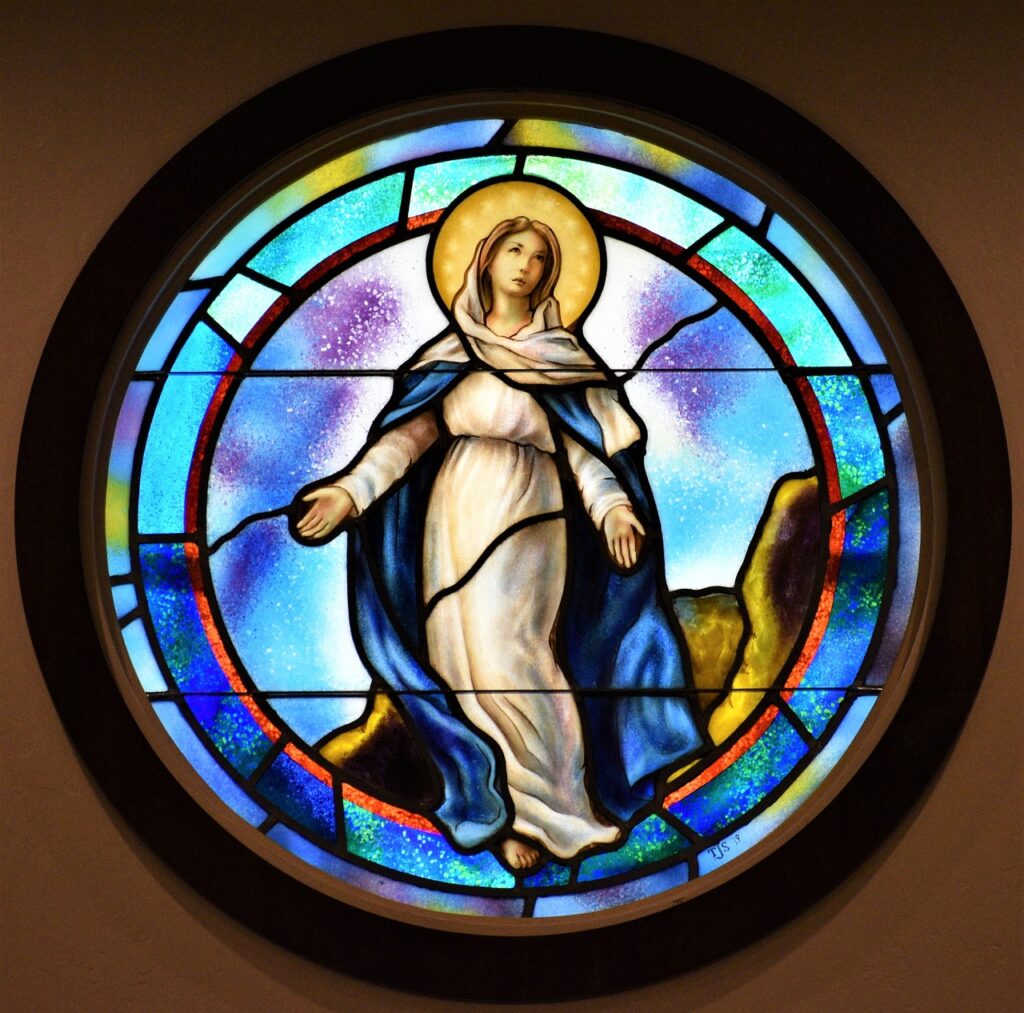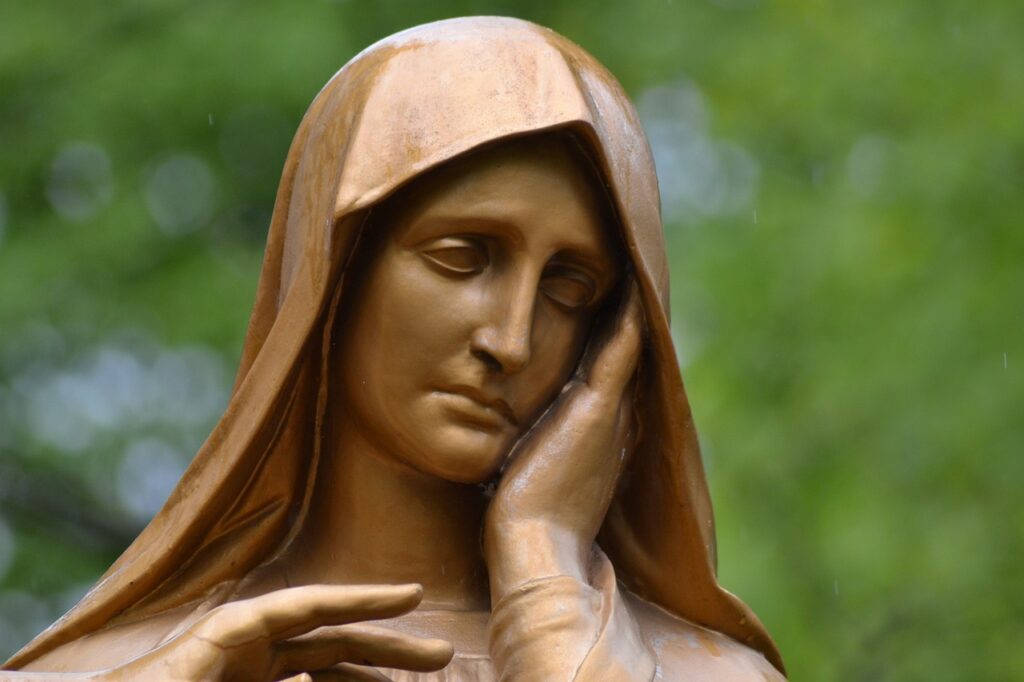Why do Catholics pray to Mary? Doesen’t the Bible say that we can only pray to God?
No. You have it wrong. The Bible does not say that we can pray only to God. It says that we must worship God alone, but there is a difference between prayer and worship. To pray means simply to ask, as in old English “I prithee.” A key element of worship, however, is sacrifice to God.
Furthermore, the Bible is not a complete handbook of all Christian practice. It is a record of the great events of God’s revelation to us, but there are many other things in Christian Tradition (paradosis in St Paul 1 Cor 11:2 and 2 Thess 2:15 & 3:6) which are not mentioned in the Bible, although they must not contradict the Scriptures.
It was the Church which chose the books of the Bible, and they form a part of the Church’s witness. God is not restricted to speaking through the written words of Scripture: He speaks through his Creation, through prophecy, through the experience of 2000 years of church history.
We can pray to Mary, asking her to pray to God for us, because:
- Jesus gave Mary to us all as our Mother, as He was dying on the Cross.
- Mary interceded at Cana for the young couple when the wine had run out, and Jesus somewhat reluctantly worked his first miracle and turned water into wine at Mary’s request.
- Mary was the closest person to Jesus during most of his life on earth. Overshadowed by the Holy Spirit, she is a most powerful intercessor for us. All generations shall call her blessed (Luke 1:48).
- Mary is not dead but alive in heaven, crowned in glory, as St John saw in Revelation ch 12. We honour Mary because God Himself has glorified her.
- God knows that every human being needs a mother. Abstractions and theological theories don’t need mothers, but human beings do. Jesus has shared with us His own Mother, to be a consoling presence for us, and to teach us to know Him better.
- Asking Mary’s prayers does not detract one iota from Jesus’s role as the one “mesites” = arbitrator, reconciler, intermediary, mediator; between God and man. Mary prays to her divine Son on our behalf. She does not short-circuit Him out of the picture. All those who imagine that Mary’s prayers somehow impugn Jesus’s prerogatives as “mesites” between God and man, should ask themselves whether they are not tainted with Mariaphobia, a disrespect for the Saviour’s mother.
As a postscript, here is what the Second Vatican Council said about Mary’s intercession in its document Lumen Gentium:
“60. There is but one Mediator as we know from the words of the apostle, “for there is one God and one mediator of God and men, the man Christ Jesus, who gave himself a redemption for all”. The maternal duty of Mary toward men in no wise obscures or diminishes this unique mediation of Christ, but rather shows His power. For all the salvific influence of the Blessed Virgin on men originates, not from some inner necessity, but from the divine pleasure. It flows forth from the superabundance of the merits of Christ, rests on His mediation, depends entirely on it and draws all its power from it. In no way does it impede, but rather does it foster the immediate union of the faithful with Christ.”
62 ….. Therefore the Blessed Virgin is invoked by the Church under the titles of Advocate, Auxiliatrix, Adjutrix, and Mediatrix. This, however, is to be so understood that it neither takes away from nor adds anything to the dignity and efficaciousness of Christ the one Mediator.
For no creature could ever be counted as equal with the Incarnate Word and Redeemer. Just as the priesthood of Christ is shared in various ways both by the ministers and by the faithful, and as the one goodness of God is really communicated in different ways to His creatures, so also the unique mediation of the Redeemer does not exclude but rather gives rise to a manifold cooperation which is but a sharing in this one source.
The Church does not hesitate to profess this subordinate role of Mary. It knows it through unfailing experience of it and commends it to the hearts of the faithful, so that encouraged by this maternal help they may the more intimately adhere to the Mediator and Redeemer…….
66. Placed by the grace of God, as God’s Mother, next to her Son, and exalted above all angels and men, Mary intervened in the mysteries of Christ and is justly honoured by a special cult in the Church. Clearly from earliest times the Blessed Virgin is honoured under the title of Mother of God, under whose protection the faithful took refuge in all their dangers and necessities. Hence after the Synod of Ephesus the cult of the people of God toward Mary wonderfully increased in veneration and love, in invocation and imitation, according to her own prophetic words: “All generations shall call me blessed, because He that is mighty hath done great things to me”. This cult, as it always existed, although it is altogether singular, differs essentially from the cult of adoration which is offered to the Incarnate Word, as well to the Father and the Holy Spirit, and it is most favorable to it. The various forms of piety toward the Mother of God, which the Church within the limits of sound and orthodox doctrine, according to the conditions of time and place, and the nature and ingenuity of the faithful has approved, bring it about that while the Mother is honoured, the Son, through whom all things have their being and in whom it has pleased the Father that all fullness should dwell, is rightly known, loved and glorified and that all His commands are observed.”
Given in Rome at St. Peter’s on November 21, 1964.



